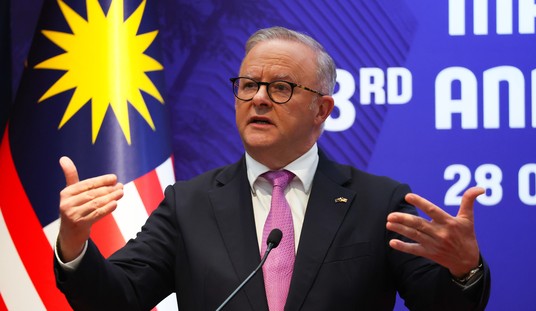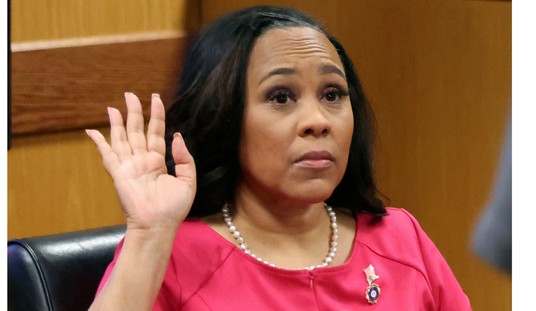That’s not what Marco Rubio thinks, but we’ll get back to that in a moment. John McCain appeared on CBS This Morning to talk about the Gang of Eight proposal on immigration reform, and he starts out by insisting that “border security is a pre-requisite” for immigration reform. But who gets to define when the border is secured in the Senate compromise plan? Later in the interview, McCain says not the commission described in the plan, but the Obama administration:
And while McCain has previously said that the path to citizenship should be contingent upon securing the border with Mexico first, he insists the process of securing the border will not slow progress toward legislation.
The border state Senator will convene a “commission made up of the most knowledgeable people including border state governors,” and explained, “the final decision will be made by the secretary of homeland security.”
Later, though, McCain rebukes Jeb Bush’s criticism of the borders-first approach by telling Charlie Rose that “the people living in the southern part of my state deserve the same security you have in your studios.” Perhaps the “recommendations” of the commission are stronger than what McCain suggests, but the entire premise sounds like they are merely consultants to the process. Granted, if the commission insists that the border isn’t secure while the DHS Secretary certifies them as such, there will be some political blowback, but that’s not a guaranteed brake on the normalization process.
In my interview with Marco Rubio yesterday, he seemed to believe that he had signed up for the guaranteed brake. And if the package doesn’t have it, Rubio committed to bailing out of it:
Yesterday, I spoke with Rubio about the proposal, and specifically about the trigger. “That’s one of the issues we have to work on,” Rubio said. “What was announced today was a set of principles.” Rubio explained that it will take a few weeks to move those principles into specific legislative language, but when that happens, the trigger has to work to make enforcement take priority. “I can tell you that based on my principles,” Rubio asserted, “I will not be supporting any law that does not ensure that the enforcement [prerequisites] happen, because I don’t want to be here in five or 10 years dealing with this again.” Otherwise, we will end up encouraging more people to flood into the U.S. illegally over the next few years, Rubio explained, while referencing what happened in 1986. “This is only worth doing if we ensure that this doesn’t happen again.”
Just to be sure, I asked the question a second time at the end of the interview. “You are committing that without an enforcement mechanism that requires the border security and the visa reform to be in place and be effective and certified by a commission in some sense, you are not going to go forward with the rest of this package?”
“I’m not going to support anything and I don’t want us to do anything,” Rubio replied, “that brings us right back to this point again in the future. And that’s why that we have to make sure that the way this law is structured, [it] ensures — guarantees — that the enforcement things happen. … Yes. That’s absolutely one of the key standards I bring, it’s one of the key parts of our principles.”
In my column for The Week, I write that Rubio is really the key to this deal:
That presents a problem for the other seven members of this group, if the final legislative language does not include those guarantees. If the trigger is real and has teeth, Rubio’s support could move a significant number of Republican votes in the Senate, and put pressure on House Republicans to finally put this issue to rest.
If Rubio peels off and announces his opposition to the effort, though, all bets are off. The Senate might still pass immigration reform, but they won’t find many Republicans other than McCain and Graham for cover; Jeff Flake could follow Rubio out of the deal under those circumstances. Without Rubio (and especially without both Rubio and Flake), the deal will go exactly nowhere in the House, which will only act on the bill if it gets substantial Republican support in the upper chamber first. John Boehner will have a tough time on this package as currently composed even with Rubio’s support. Without Rubio, it might prompt a real leadership fight, and Boehner’s unlikely to test out his standing to push through a proposal with the stench of 1986 on it, regardless of Democratic support.
It seems that even the members of this Gang of Eight are having trouble figuring out exactly what their own agreement meant. As Greg Sargent put it on Twitter:
@EdMorrissey this confusion among Senators on this core point is ridiculous
— Greg Sargent (@ThePlumLineGS) January 29, 2013
They will have a tough enough time pushing this through Congress even with a guaranteed brake on the process based on a lack of progress on border security and visa reform. Without it, it’s going nowhere. Maybe the Gang of Eight should compare notes a little more.








Join the conversation as a VIP Member